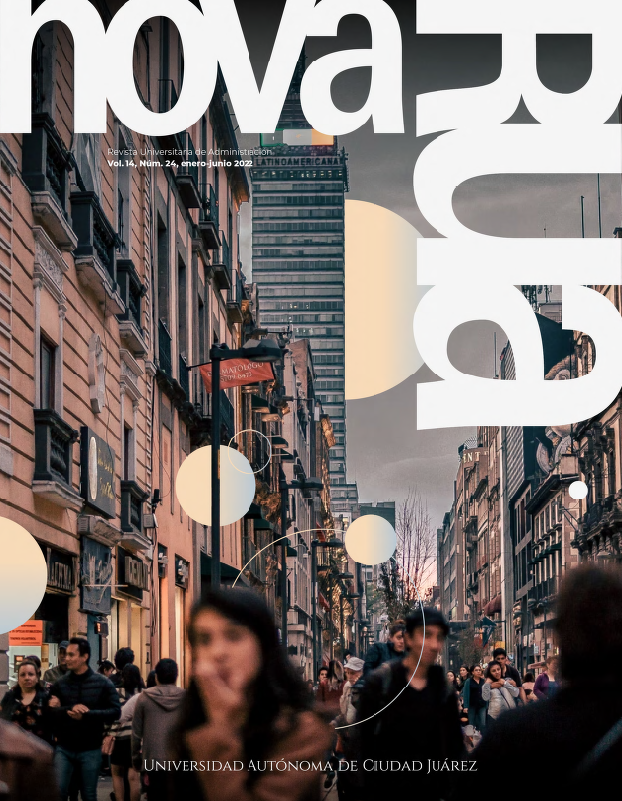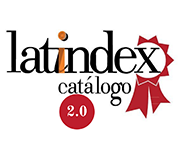Una revisión de literatura sobre las estrategias tecnológicas usadas en el sector automotriz derivadas de la pandemia del COVID-19
DOI:
https://doi.org/10.20983/novarua.2022.24.2Palabras clave:
Industria automotriz, Covid-19, Adopción de tecnología, Innovación, Industria 4.0Resumen
La industria automotriz se ha visto gravemente afectada por la crisis provocada por la pandemia del COVID-19 restringiendo las actividades presenciales que han provocado una baja o nula productividad, así como una disminución del crecimiento global, frenando incluso el desarrollo de productos innovadores como la introducción de coches eléctricos y autónomos. Se realizó una revisión bibliográfica sobre la relación existente en el ámbito científico que permitió identificar opciones viables para la adopción de tecnologías que permitan afrontar este tipo de cambios disruptivos en este sector. Se desarrolló el análisis de los conceptos de Industria 4.0 e Investigación y Desarrollo, relacionándolos con las estrategias tecnológicas llevadas a cabo en el sector para encontrar un patrón de comportamiento que permita dar un aporte científico con estos enfoques de aplicación.
Citas
Agudelo, M., Chomali, E. y Suniaga, J. (2020). Las oportunidades de la digitalización en América Latina frente al COVID-19. Banco de Desarrollo de América Latina. Recuperado de: https://scioteca.caf.com/handle/123456789/1541.
Ali, H. (2021). The role of firm innovativeness in the time of Covid-19 crisis: Evidence from Chinese manufacturing firms. Asian Journal of Technology Innovation, 1-26. DOI: https://doi.org/10.1080/19761597.2021.1976063.
Anzolin, G., Andreoni, A. y Zanfei, A. (2020). Robot adoption and FDI driven transformation in the automotive industry. International Journal of Automotive Technology and Management, 20(2), 215-237. DOI: https://doi.org/10.1504/ijatm.2020.108586.
Arcidiacono, F., Ancarani, A., di Mauro, C. y Schupp, F. (2019). Where the Rubber Meets the Road. Industry 4.0 among SMEs in the Automotive Sector. IEEE Engineering Management Review, 47(4), 86-93. DOI: https://doi.org/10.1109/EMR.2019.2932965.
Augurio, A., Mazzoni, C., Castaldi, L. y Cerchiello, T. (2020). e-mobility in the Age of COVID-19. Business Under Crisis, 1, 101-123. DOI: https://doi.org/10.1007/978-3-030-76567-5_6.
Bai, C., Dallasega, P., Orzes, G. y Sarkis, J. (2020). Industry 4.0 technologies assessment: A sustainability perspective. International Journal of Production Economics, 229, 1-15. DOI: https://doi.org/10.1016/j.ijpe.2020.107776.
Balakrishnan, A. y Ramanathan, U. (2021). The role of digital technologies in supply chain resilience for emerging markets’ automotive sector. Supply Chain Management, 26(6), 654-671. DOI: https://doi.org/10.1108/SCM-07-2020-0342.
Bhatt, A. y Shrivastava, N. (2022). Application of Artificial Neural Network for Internal Combustion Engines: A State-of-the-Art Review. Archives of Computational Methods in Engineering, 29(2), 897-919. DOI: https://doi.org/10.1007/s11831-021-09596-5.
Brückmann, G., Willibald, F. y Blanco, V. (2021). Battery Electric Vehicle adoption in regions without strong policies. Transportation Research Part D: Transport and Environment, 90, 1-18. DOI: https://doi.org/10.1016/j.trd.2020.102615.
Carroll, L. S. (2017). A comprehensive definition of technology from an ethological perspective. Social Sciences, 6(4), 126. DOI: https://doi.org/10.3390/socsci6040126.
Cazcarro, I., García, D., Iribarren, D., Linares, P., Romero, J., Arocena, P., Arto, I., Banacloche, S., Lechón, S., Miguel, L., Zafrilla, J., López, L., Langarita, R. y Cadarso, M. (2022). Energy-socio-economic-environmental modelling for the EU energy and post-COVID-19 transitions. Science of the Total Environment, 805, 1-8. DOI: https://doi.org/10.1016/j.scitotenv.2021.150329.
CCOO (2017). La Digitalización y la Industria. Secretaría de Estrategias Industriales. Recuperado de: https://industria.ccoo.es/4290fc51a3697f785ba14fce86528e10000060.pdf.
Collie, B., Grover, P., Huber, T., Kilian, R., Waas A. y Xu, G. (2020). Las empresas automotrices sobrevivirán al COVID-19 y saldrán fortalecidas. Boston Consulting Group. Recuperado de: https://www.bcg.com/publications/2020/auto-companies-will-outlast-and-thrive-post-covid-19.
Del Val, J. (18 de marzo, 2016). Industria 4.0 - La Transformación digital de la Industria. Deusto, Revista de ingeniería. Recuperado de: https://revistaingenieria.deusto.es/industria-4-0-la-transformacion-digital-de-la-industria/.
Eichenberg, P. (21 de marzo, 2021). Un año después: el impacto duradero de la COVID en la industria automotriz. QAD Blog. Recuperado de: https://www.qad.com/es-MX/blog.mx/-/blogs/un-ano-despues-el-impacto-duradero-de-la-covid-en-la-industria-automotriz.
Franceschinis, C., Thiene, M., Scarpa, R., Rose, J., Moretto, M. y Cavalli, R. (2017). Adoption of renewable heating systems: An empirical test of the diffusion of innovation theory. Energy, 125, 313-326. DOI: https://doi.org/10.1016/j.energy.2017.02.060.
García, M. y Esteban, M. (2020). A project management approach to competitive intelligence. Journal of Intelligence Studies in Business, 10(3), 8-23. DOI: https://doi.org/10.37380/jisib.v10i3.636.
Geldes, C. y Heredia, J. (2020). Innovando en pandemia y en la nueva normalidad. Gestión y tendencias, 5(3), 2-12. Recuperado de: https://fen.uahurtado.cl/wp- content/uploads/2021/04/gestenVol5-Num3-2020.pdf.
González, G. (2021). Guidelines for Restructuring the World Auto Industry and Their Implications for Mexico. Norteamérica, 16(2), 35-55. DOI: https://doi.org/10.22201/cisan.24487228e.2021.2.442.
González, R. y Hernández, F. (2021). Asia y el gran desafío de la COVID-19: resiliencia y adaptación. Economía y Desarrollo, 165(1). Recuperado de: http://scielo.sld.cu/scielo.php?script=sci_arttext&pid=S0252-85842021000200009.
Hickie, D. y Hickie, J. (2021). The impact of Industry 4.0 on supply chains and regions: innovation in the aerospace and automotive industries. European Planning Studies, 29(9), 1606-1621. DOI: https://doi.org/10.1080/09654313.2021.1963048.
Hidayatno, A., Rahman, I. y Daniyasti, D. (2019). Conceptualizing the promise of industry 4.0 technology adoption: Case study of Indonesian automotive industry. ACM International Conference Proceeding Series, 334-338. DOI: https://doi.org/10.1145/3364335.3364350.
Hofstätter, T., Krawina, M., Mühlreiter, B., Pöhler, S. y Tschiesne, A. (27 de Octubre, 2020). Reimaginando el futuro de la industria automotriz: es ahora o nunca. McKinsey & Company. Recuperado de: https://www.mckinsey.com/industries/automotive-and-assembly/.
Hu, J., Javaid, A. y Creutzig, F. (2021). Leverage points for accelerating adoption of shared electric cars: Perceived benefits and environmental impact of NEVs. Energy Policy, 155, 112349. DOI: https://doi.org/10.1016/j.enpol.2021.112349.
IndustriALL Global Union (2020). Face au covid-19 il est urgent d’adopter des plans de relance économique et de prendre des mesures. Consejo Global Unions. Recuperado de: https://www.ituc-csi.org/face-au-covid-19-il-est-urgent-d.
Kaeo-Tad, N., Jeenanunta, C., Chumnumporn, K., Nitisahakul, T. y Sanprasert, V. (2021). Resilient manufacturing: Case studies in Thai automotive industries during the COVID-19 pandemic. Engineering Management in Production and Services, 13(3), 99-113. DOI: https://doi.org/10.2478/emj-2021-0024.
Kaitwade, N. (2021). COVID-19 shatters global automotive industry; sales of metal powder take a nosedive amid wavering demand. Metal Powder Report, 76(3), 137-139. DOI: https://doi.org/10.1016/j.mprp.2020.06.059.
Kamble, S., Gunasekaran, A. y Gawankar, S. (2018). Sustainable Industry 4.0 framework: A systematic literature review identifying the current trends and future perspectives. Process Safety and Environmental Protection, 117, 408-425. DOI: https://doi.org/10.1016/j.psep.2018.05.009
Kumar, R., Guha, P. y Chakraborty, A. (2022). Comparative assessment and selection of electric vehicle diffusion models: A global outlook. Energy, 238, 121932. DOI: https://doi.org/10.1016/j.energy.2021.121932.
Lin, D., Lee, C., Lau, H. y Yang, Y. (2018). Strategic response to Industry 4.0: an empirical investigation on the Chinese automotive industry. Industrial Management and Data Systems, 118(3), 589-605. https://doi.org/10.1108/IMDS-09-2017-0403.
Mahaboob, S., Kerbache, L. y Elomri, A. (2022). Potential of additive manufacturing for upstream automotive supply chains. Supply Chain Forum: An International Journal, 23(1), 1-19. DOI: https://doi.org/10.1080/16258312.2021.1973872.
Marak, Z., Tiwari, A. y Tiwari, S. (2019). Adoption of 3D printing technology: an innovation diffusion theory perspective. International Journal of Innovation, 7(1), 87-103. DOI: https://doi.org/https://doi.org/10.5585/iji.v7i1.393.
Mendoza, A. y Rendón, L. (2021). Identifying resilient industries in Mexico’s automotive cluster: Policy lessons from the great recession to surmount the crisis caused by COVID 19. Growth and Change, 52, 1552–1575. DOI: https://doi.org/10.1111/grow.12515.
Mohammadi, M., Poursaberi, R. y Salahshoor, M. (2018). Evaluating the adoption of evidence-based practice using Rogers’s diffusion of innovation theory: A model testing study. Health Promotion Perspectives, 8(1), 25–32. DOI: https://doi.org/10.15171/hpp.2018.03.
Muhammad, M., Kerbache, L. y Elomri, A. (2022). Potential of additive manufacturing for upstream automotive supply chains. Supply Chain Forum, 23(1), 1-19. DOI: https://doi.org/10.1080/16258312.2021.1973872.
OCDE (2017). Incrementar la productividad en las pequeñas empresas tradicionales. Mexico Policy Brief. Recuperado de: https://www.oecd.org/policy-briefs/mexico-incrementar-la-productividad-en-las-pequenas-empresas-tradicionales.pdf.
OIT (2020). La COVID-19 y la industria automotriz. Recuperado de: https://www.oitcinterfor.org/sites/default/files/file_publicacion/sect_automotriz.pdf.
ONU (2022). Dia de las Microempresas y las Pequeñas y Medianas Empresas. Recuperado de: https://www.un.org/es/observances/micro-small-medium-businesses-day.
Pelle, A. y Tabajdi, G. (2021). Covid-19 and transformational megatrends in the European automotive industry: Evidence from business decisions with a Central and Eastern European focus. Entrepreneurial Business and Economics Review, 9(4), 19-33. DOI: https://doi.org/10.15678/EBER.2021.090402.
Peralta, J., Martínez, B. y Enríquez, J. (2020). Industria 4.0. Inventio, 16(39), 1-7. DOI: https://doi.org/10.30973/inventio/2020.16.39/4.
Peroni, F. (21 de marzo, 2020). Brazilian carmakers to stop production amid virus spread. Fastmarkets MB. Recuperado de: https://www.metalbulletin.com/Article/3924391/Brazilian-carmakers-to-stop-production-amid-virus-spread.html.
Ríos, L., Pérez, L. y Pérez, I. (2019). Tendencias actuales de la industria 4.0. Reflexiones Contables, 2(2), 8-22. DOI: https://doi.org/10.22463/26655543.2982.
Rocchetta, S. y Upadhayay, N. (2021). Innovation has the power: the case of the Italian automotive sector during economic downturns. International Journal of Logistics Research and Applications, 1-20 DOI: https://doi.org/10.1080/13675567.2021.1993158.
Rostás, R. (20 de marzo, 2020). Ford to suspend output in Brazil, Argentina from next week amid coronavirus pandemic. Fastmarkets MB. Recuperado de: https://www.metalbulletin.com/Article/3924002/Ford-to-suspend-output-in-Brazil-Argentina-from-next-week-amid-coronavirus-pandemic.html.
Saadi, T. (2018). Una nueva ola de innovación digital está reconfigurando Asia y elevando el potencial de crecimiento de la región. Finanzas y Desarrollo: Publicación Trimestral del Fondo Monetario Internacional y del Banco Mundial, 55(3), 31-33. Recuperado de: https://www.imf.org/external/pubs/ft/fandd/spa/2018/09/pdf/sedik.pdf.
Sjoberg, K. (2021). Activities on Legislation for Autonomous Vehicles Takeoff [Connected and Automated Vehicles]. IEEE Vehicular Technology Magazine, 16, 149-152. DOI: https://doi.org/10.1109/MVT.2021.3091393.
Spieske, A. y Birkel, H. (2021). Improving supply chain resilience through industry 4.0: A systematic literature review under the impressions of the COVID-19 pandemic. Computers and Industrial Engineering, 158, 107452. DOI: https://doi.org/10.1016/j.cie.2021.107452.
Sütőová, A., Šooš, Ľ. y Kóča, F. (2020). Learning needs determination for industry 4.0 maturity development in automotive organisations in Slovakia. Quality Innovation Prosperity, 24(3), 122-139. DOI: https://doi.org/10.12776/QIP.V24I3.1521.
Tamtam, F. y Tourabi, A. (2021). Analysis of the agility of the automotive industry supply chain in times of COVID-19: A case study. EUREKA: Physics and Engineering, (6), 112-120. DOI: https://doi.org/10.21303/2461-4262.2021.001949.
Trovao, J. (2020). Automotive Electronics under the COVID-19 Shadow [Automotive Electronics]. IEEE Vehicular Technology Magazine, 15(3), 101-108. DOI: https://doi.org/10.1109/MVT.2020.2998710.
UAW (31 de marzo, 2020). Statement of UAW President Rory L. Gamble on Ford’s decision to extend production reopening dated. News. Recuperado de: https://uaw.org/statement-uaw-president-rory-l-gamble-fords-decision-extend-production-reopening-date/.
Vrontis, D., Thrassou, A., Efthymiou, L., Uzunboylu, N., Weber, Y., Shams, S. M. y Tsoukatos, E. (2022). Editorial Introduction: Business Under Crisis -Avenues for Innovation, Entrepreneurship and Sustainability. En Business Under Crisis, Volume III (pp. 1-17). Palgrave MacMillan, Cham. Recuperado de: http://www.palgrave.com/gp/series/15956.
World Bank (2022). World Development Report 2022 - Finance for an Equitable Recovery. Recuperado de: https://openknowledge.worldbank.org/bitstream/handle/10986/36883/9781464817304.pdf.
Zhurova, L. y Krakovskaya, I. (2021). Global challenges and formation of a strategy for sustainable development of automotive industry in Russia. World Economy and International Relations, 65(10), 45-53. DOI: https://doi.org/10.20542/0131-2227-2021-65-10-45-53.
Publicado
Número
Sección
Licencia
Derechos de autor 2022 Ángel Ricardo Rendón Arenas , Luz del Carmen Muñoz Palacios

Esta obra está bajo una licencia internacional Creative Commons Atribución-NoComercial-CompartirIgual 4.0.
Todos los contenidos de la edición electrónica de la revista se distribuyen bajo una licencia de uso y distribución “Creative Commons Reconocimiento-No Comercial-Compartir Igual 4.0 Internacional” (CC-BY-NC-SA). Puede consultar desde aquí la versión informativa de la licencia.
Aquellos autores/as que tengan publicaciones con esta revista, aceptan los términos siguientes: a) Los autores/as conservarán sus derechos de autor y garantizarán a la revista el derecho de primera publicación de su obra; b) Se permite y recomienda a los autores/as difundir su obra a través de Internet (p. ej.: en archivos telemáticos institucionales o en su página web), lo cual puede producir intercambios interesantes y aumentar las citas de la obra publicada. (Véase El efecto del acceso abierto).












